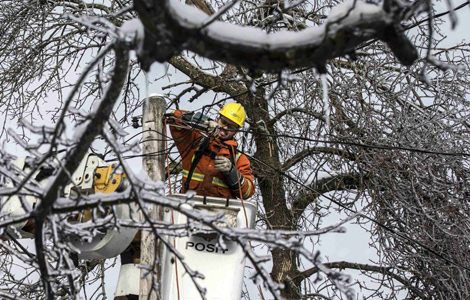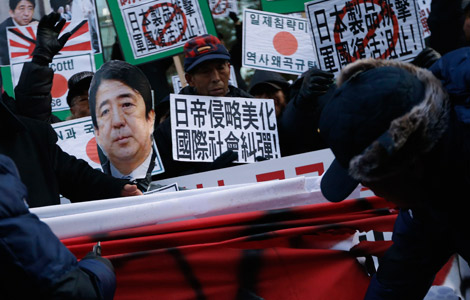Abe's shrine visit affronts world
Updated: 2013-12-30 07:15
By Li Wei (China Daily)
|
||||||||
Shinzo Abe visited the controversial Yasukuni Shrine that honors 14 World War II Class A war criminals on Thursday, making him the first sitting Japanese prime minister in seven years to set foot in the shrine.
The Yasukuni Shrine is a symbol of Japanese aggression in WWII. The prime minister's provocative visit is a political act, which highlights his wrong understanding of Japan's militarist past and dangerous political orientation. The visit in essence is a flagrant provocation to the peace-loving people of the entire world, a gross trampling upon historical justice and human decency, and an outrageous challenge to the post-war international order and the international community.
Top among the reasons for Abe's shrine visit is his political stance, the core of which is desire to overthrow the international community's trial of Japanese militarism and get rid of its image as a vanquished country in a bid to develop the country into a major political power with strong and independent military strength.
Abe's political stance has been fully exposed in his book Towards a Beautiful Country: My Vision For Japan and a series of speeches. In his childhood, Abe was deeply influenced by his grandfather Nobusuke Kishi, who succeeded in turning himself from a war criminal into the prime minister. Abe inherited Kishi's political ideas. But different from his grandfather's gray wisdom, Abe prefers to express his outlook without any disguise. So it's not hard to understand he has committed some transgressions in revealing his own political ambitions.
Interest groups that have a close relationship with Abe, mainly some right-wing groups and right-leaning politicians and businessmen, have also played a role in bringing about Abe's visit to the Yasukuni Shrine. These people gave Abe support and encouragement after he resigned as prime minister in 2007. Now in power once again, Abe is bound to repay them and must work under pressure from right-wing groups and right-leaning interest groups.
Abe has repeatedly expressed his regret that he did not pay his respects at the shrine during his first term in office and said he would deliver on this political commitment at an appropriate time. Finally, despite Tokyo's diplomatic tensions with Beijing and Seoul, he entered the shrine on the first anniversary of the day he started his second term as prime minister.
Most Viewed
Editor's Picks

|

|

|

|

|

|
Today's Top News
Auto industry rolls through ’13 for China, US
Outrage still festers over Abe shrine visit
Suicide bomber kills 16 at Russian train station
Li says economy stable in 2014
Bigger role considered in the Arctic
3rd high-level official probed
Abe stepping up military agenda
NPO rules expected in 2014
US Weekly

|

|















